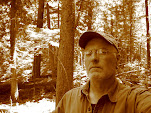I set out from the beach on a falling tide that limits my choices of where to go, but, in this prolonged cold, my choices have already been reduced, the fresh water and protected places of the salt marshes frozen over, at least well enough to keep my canoe out. The sky is high thin clouds that signal a possibility of snow, but the wind is light and the air about 20F.
 |
| Charles Island |
This winter has been the opposite of the last, at least in relation to the freezing point of water. Last winter, the weather was above freezing with only short spurts of icier cold. This winter has been a long stretch of subfreezing weather that has locked up the fresh water streams. Just a day or two at a time of warmer weather comes, tempting the ice to break up, but not completing the task.
32F (or 0C) is everything. Water, snow and ice have dozens of different properties to take on within a couple degrees of that number. Most people don't quite get it, except to how it affects their commutes, but people of the outdoors see it first hand. The nordic skiers have one or two ski wakes for 10 to 20 degrees, another one or two for 20 to 28 degrees, and about a dozen for 30 to 34 degrees, when the snow is part water, part snow, and part ice in varying degrees. From my canoe, I notice the birds. This winter, a great many more birds are in the salt water. Ducks and geese that prefer fresh water or brackish salt marshes are doing their feeding in the shallows of the sea. The population and density is up as they too, have limited choices of where to go.
 |
| Milford Harbor |

1 comment:
Well said!
Post a Comment